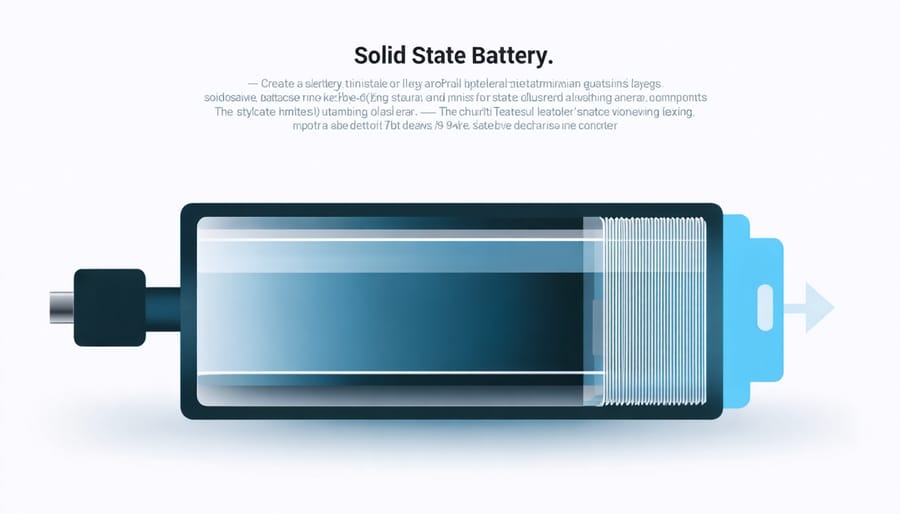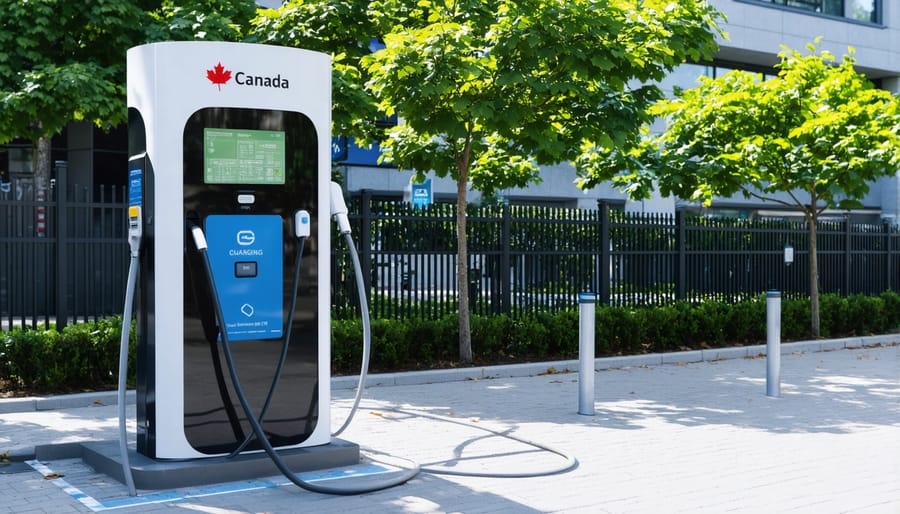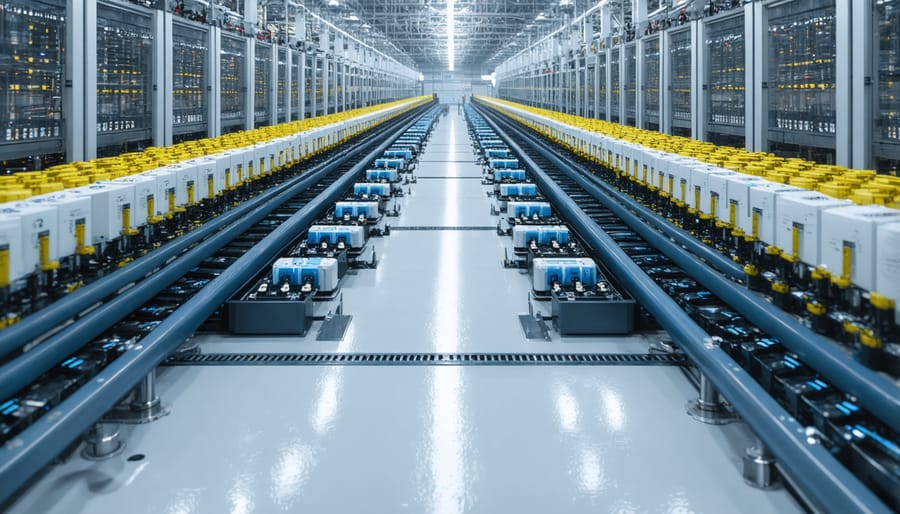The race to revolutionize electric vehicle batteries stands at a critical inflection point, with breakthrough technologies promising to reshape the automotive industry’s future. As green transportation technologies advance, next-generation batteries are poised to deliver unprecedented range, charging speeds, and cost efficiencies. Canadian innovations in solid-state batteries and advanced cathode materials are attracting global attention, with domestic manufacturers securing strategic partnerships worth billions. Industry leaders predict a 40% reduction in battery costs by 2025, while energy density improvements could extend EV ranges beyond 1,000 kilometers per charge. These developments position Canada as a pivotal player in the global EV battery supply chain, offering compelling opportunities for investors and businesses across the clean technology sector. From Vancouver-based quantum computing applications in battery design to Toronto’s advanced manufacturing facilities, Canadian expertise is driving the transition toward sustainable transportation solutions that promise to revolutionize how we move.
Solid-State Batteries: The Canadian Breakthrough

Safety and Performance Advantages
Next-generation EV battery technologies offer significant improvements over traditional lithium-ion batteries, particularly in safety and performance metrics. Advanced solid-state batteries eliminate the risk of thermal runaway, a common safety concern in current EV batteries, by replacing flammable liquid electrolytes with stable solid materials.
These innovative batteries demonstrate superior thermal stability, reducing the need for complex cooling systems and enhancing overall vehicle safety. Industry testing shows they can withstand extreme temperatures and physical damage without compromising performance or safety, making them ideal for Canada’s diverse climate conditions.
Performance advantages are equally impressive, with new battery technologies offering up to 80% faster charging times and 50% higher energy density. This translates to extended driving ranges and reduced charging frequency for EV owners. Canadian battery manufacturer BlueSky Energy reports their latest prototypes achieve full charges in under 15 minutes while maintaining stable performance for over 1,000 cycles.
Moreover, these advanced batteries feature enhanced monitoring systems that provide real-time performance data and early warning signals for potential issues. This predictive capability allows for proactive maintenance, reducing downtime and extending battery life. For fleet operators and individual owners alike, these improvements represent significant operational benefits and reduced maintenance costs.
Canadian Research Centers Making Waves
Canadian research institutions are taking bold strides in solid-state battery development, positioning the country as a significant player in next-generation EV technology. The University of Waterloo’s Institute for Sustainable Energy leads groundbreaking research through its advanced battery testing facility, where researchers have achieved promising results in lithium metal solid-state batteries.
In Montreal, McGill University’s Materials Engineering department has partnered with major automotive manufacturers to develop innovative electrode materials that significantly enhance battery performance and safety. Their recent breakthrough in ceramic electrolyte composition has garnered international attention.
McMaster University’s automotive research center has established itself as a pioneer in scaled manufacturing processes for solid-state batteries. Dr. Sarah Chen, lead researcher at McMaster, notes: “Our focus on practical implementation has accelerated the timeline from lab to market significantly.”
The National Research Council of Canada (NRC) continues to foster collaboration between academic institutions and industry partners through its advanced materials research initiative. Their Vancouver facility has recently unveiled a pilot production line for solid-state battery components, demonstrating Canada’s commitment to commercialization.
These research centers benefit from strategic government funding, including a recent $40 million federal grant dedicated to solid-state battery development. This investment strengthens Canada’s position in the global race to revolutionize EV battery technology while creating high-skilled employment opportunities across the country.
Fast-Charging Solutions Taking Shape

Infrastructure Development
The expansion of charging infrastructure continues to be a crucial factor in supporting next-generation EV battery technologies. Canadian utilities and private companies are making significant investments in fast-charging networks, with plans to install over 50,000 new charging stations across the country by 2025. Major urban centers like Toronto, Vancouver, and Montreal are leading the way with innovative solutions, including wireless charging pilots and smart grid integration.
Industry leaders are developing advanced charging technologies capable of delivering higher power outputs, reducing charging times to under 10 minutes for newer battery systems. The integration of smart charging management systems helps optimize grid load and reduce strain during peak usage periods.
Several Canadian provinces have launched initiatives to support charging infrastructure development. British Columbia’s CleanBC program and Quebec’s Circuit électrique network serve as successful models for public-private partnerships in infrastructure deployment.
Looking ahead, emerging technologies like battery swapping stations and mobile charging units are being tested to complement traditional charging infrastructure. These innovations, combined with improvements in battery capacity and charging speeds, are creating a more robust ecosystem for EV adoption. Industry experts predict that by 2030, charging stations will be as commonplace as traditional gas stations, supporting the next wave of EV battery technology.
Industry Partnerships
Strategic partnerships between automakers and technology companies are reshaping the electric vehicle battery landscape. Major collaborations, such as the recent partnership between General Motors and POSCO Chemical to establish a cathode facility in Quebec, demonstrate Canada’s growing importance in the global EV supply chain.
Ford Motor Company and BMW have invested significantly in solid-state battery developer Solid Power, accelerating the development of next-generation battery technology. Meanwhile, Tesla’s collaboration with Panasonic continues to drive innovation in battery cell design and production efficiency.
In the Canadian market, Vancouver-based Nano One Materials has secured partnerships with multiple global automakers to advance their patented battery material processing technology. The company’s success highlights the potential for Canadian firms to lead in battery innovation.
Emerging partnerships between mining companies and battery manufacturers are also strengthening the domestic supply chain. The collaboration between Lion Electric and Northern Graphite showcases how Canadian companies are working together to secure critical battery materials while reducing dependence on international suppliers.
These strategic alliances are essential for advancing battery technology, sharing research and development costs, and establishing robust supply chains that will support the growing EV market.
Sustainable Battery Manufacturing
Green Production Methods
The push towards sustainable battery production is revolutionizing manufacturing processes across Canada and globally. Leading manufacturers are adopting water-based electrode processing, eliminating toxic NMP solvents traditionally used in battery production. This shift reduces environmental impact while cutting production costs by up to 30%.
Canadian battery maker Stromcore Energy has pioneered a zero-waste manufacturing system, recycling 98% of production materials and powered entirely by renewable energy. Their innovative approach has become a model for sustainable battery manufacturing across North America.
Dry electrode technology, championed by Tesla and several Canadian startups, eliminates the need for energy-intensive drying processes. This method reduces energy consumption by 40% compared to conventional manufacturing methods while maintaining battery performance standards.
The integration of artificial intelligence in production lines is optimizing resource usage and minimizing waste. Smart manufacturing systems can predict maintenance needs, adjust production parameters in real-time, and ensure consistent quality while reducing energy consumption.
Water recycling systems in battery plants are becoming standard practice, with new facilities designed to operate on closed-loop water systems. This approach significantly reduces freshwater consumption and prevents environmental contamination.
These green production methods not only benefit the environment but also create competitive advantages through reduced operational costs and enhanced brand value, positioning Canadian manufacturers at the forefront of sustainable battery technology.
Recycling and Resource Recovery
As the electric vehicle industry grows, innovative recycling and resource recovery solutions are emerging as crucial components of sustainable battery manufacturing. Canadian companies like Li-Cycle are leading the way with advanced hydrometallurgical processes that can recover up to 95% of critical materials from spent batteries.
These cutting-edge recycling technologies are creating a circular economy for EV batteries, significantly reducing the need for new raw material extraction. The process involves dismantling batteries, separating components, and recovering valuable metals like lithium, nickel, and cobalt for reuse in new battery production.
“The future of EV battery sustainability lies in closed-loop systems,” says Dr. Sarah Thompson, Director of Clean Technology Innovation at the National Research Council Canada. “Our recycling capabilities are advancing rapidly, making battery production more environmentally and economically viable.”
Several Canadian provinces are implementing battery recycling programs, with Quebec and Ontario establishing specialized facilities to process end-of-life EV batteries. These initiatives are attracting international investment and creating new business opportunities in the recycling sector.
The development of direct recycling methods, which preserve the crystal structure of cathode materials, promises to further improve recovery efficiency while reducing processing costs. This advancement could help Canadian manufacturers maintain a competitive edge while supporting the country’s clean technology goals.

Investment Opportunities in Canadian Battery Tech
Government Initiatives
The Canadian government has demonstrated strong commitment to advancing electric vehicle battery technology through various strategic initiatives and funding programs. Natural Resources Canada’s $3.8 billion Critical Minerals Strategy includes significant investments in battery supply chain development, while Innovation, Science and Economic Development Canada (ISED) has allocated $1.7 billion specifically for EV and battery manufacturing support.
Provincial governments are also playing crucial roles. Quebec’s $7 billion electrification strategy includes substantial funding for battery innovation and production facilities, while Ontario has committed $5 billion to attract EV and battery manufacturers. British Columbia’s CleanBC program offers incentives for battery research and development projects.
These initiatives have already shown positive results. The federal government’s Strategic Innovation Fund has supported major projects like the Stellantis-LG Energy Solution battery manufacturing facility in Windsor, Ontario, creating thousands of jobs and strengthening Canada’s position in the global EV supply chain.
The Canada Infrastructure Bank has earmarked $500 million for EV charging infrastructure and battery storage projects, while the Zero Emission Vehicle Infrastructure Program provides matched funding for charging station deployment. Additionally, the Clean Growth Hub offers coordinated support for clean technology companies, including those focused on battery innovation.
Industry leaders praise these programs for creating a supportive ecosystem for battery technology advancement. According to Sarah Thompson, CEO of Canadian Battery Innovation Alliance, “Government support has been instrumental in positioning Canada as a global leader in sustainable battery production.”
Market Growth Potential
The global electric vehicle battery market is experiencing unprecedented growth, with projections indicating a compound annual growth rate (CAGR) of 18.7% from 2023 to 2030. This explosive expansion is driven by increasing consumer demand for EVs, supportive government policies, and technological advancements in battery development.
Canada’s strategic position in this market is particularly noteworthy, given its abundant natural resources and established automotive manufacturing infrastructure. Industry experts estimate that the Canadian EV battery supply chain could generate up to $48 billion in annual economic activity by 2030.
Major automakers and battery manufacturers are already investing heavily in Canadian facilities. For instance, the recent $5 billion investment in Ontario’s EV battery manufacturing capabilities demonstrates the market’s confidence in Canada’s potential as a global battery production hub.
Key growth drivers include:
– Rising environmental consciousness among consumers
– Government incentives and regulations supporting EV adoption
– Decreasing battery production costs
– Technological improvements in battery efficiency and range
– Growing charging infrastructure
The market opportunity extends beyond vehicle batteries to include energy storage systems, creating additional revenue streams for manufacturers and investors. Canadian companies are well-positioned to capitalize on this diversification, particularly in developing advanced battery materials and recycling technologies.
Investment in research and development continues to accelerate, with Canadian institutions leading breakthrough innovations in solid-state batteries and sustainable manufacturing processes, further strengthening the country’s competitive advantage in the global market.
The future of electric vehicle battery technology stands at a pivotal moment, with breakthrough innovations promising to reshape the automotive industry. From solid-state batteries to advanced lithium-ion technologies, these developments are set to address current limitations while opening new possibilities for manufacturers and consumers alike.
Canadian companies and research institutions continue to play a crucial role in this evolution, with significant investments in battery manufacturing facilities and R&D centers across the country. The establishment of battery gigafactories in Ontario and Quebec positions Canada as a key player in the North American EV supply chain.
Industry experts project that by 2025, we’ll see EVs with ranges exceeding 700 kilometers on a single charge, charging times under 10 minutes, and battery lifespans of over 15 years. These improvements, coupled with declining production costs, will make electric vehicles increasingly attractive to both consumers and fleet operators.
The shift toward sustainable and locally sourced materials, along with enhanced recycling capabilities, demonstrates the industry’s commitment to environmental stewardship. As government initiatives continue to support this transition, businesses can expect growing opportunities in battery production, charging infrastructure, and related services.
For Canadian businesses and investors, the evolving EV battery landscape presents compelling opportunities for growth and innovation. With strong government support, abundant natural resources, and a skilled workforce, Canada is well-positioned to become a global leader in next-generation battery technology.
